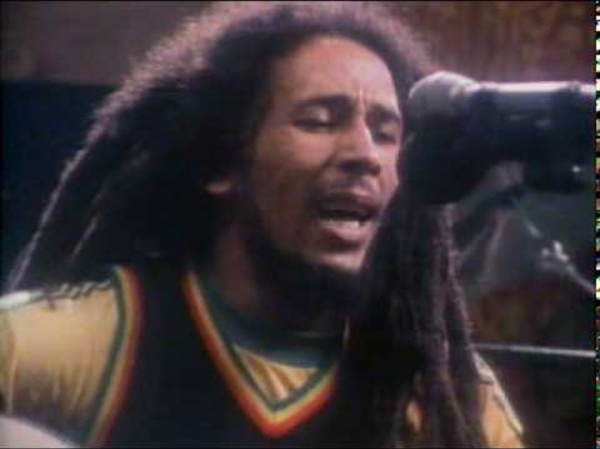



http://www.youtube.com/watch?v=OFGgbT_VasI
Bob Marley Un article de Wikipédia, l'encyclopédie libre. Pour les articles homonymes, voir Marley. Bob Marley Bob Marley en concert au Dalymount Park de Dublin le 6 juillet 1980. Robert Nesta Marley dit Bob Marley, né le à Nine Miles (Jamaïque) et mort le à Miami (États-Unis), est un auteur-compositeur-interprète, chanteur et musicien jamaïcain.
Bob Marley - Bad Boys Bob Marley Running away lyrics The Wailers Are a Living History of Reggae - The Wailers It’s been more than four decades since Bob Marley & the Wailers’ inception and 36 years since the death of their founder and guiding star, but the band continues to spread the positive messages of reggae. Guitarists Junior Marvin and Donald Kinsey are acutely aware of the significance of their early days playing alongside one of the greatest songwriters of the 20th Century. “What I could feel from the music was that there was a very positive energy,” Kinsey says. “It was a different message in the music, and it was a different rhythm.” He still sounds giddy when he speaks of those days. His breath wavers and his voice pitches up with excitement as memories flood back. Bob Sinclar - The Beat Goes On
Biography & History Jamaican teenager Millie Small stunned the music business by reaching number two in both the U.S. and the U.K. with "My Boy Lollipop" in 1964. Born Millicent Small in Clarendon, she was the daughter of an overseer on a sugar plantation (her reported date of birth varies from 1942 to 1948), and she was one of the very few female singers in the early ska era in Clarendon. She was already recording in her teens for Sir Coxone Dodd's Studio One label with Roy Panton (as Roy & Millie), with a hit behind her in that capacity ("We'll Meet"), when Chris Blackwell discovered her and brought her to England in late 1963. Her fourth recording, "My Boy Lollipop," cut in London by a group of session musicians that included guitarist Ernest Ranglin (and, according to some accounts, Rod Stewart on harmonica) and featuring her childlike, extremely high-pitched vocals, was the first (and indeed, one of the few) international ska hits.
Reggae - Wikipedia Music genre from Jamaica Reggae () is a music genre that originated in Jamaica in the late 1960s. The term also denotes the modern popular music of Jamaica and its diaspora.[1] A 1968 single by Toots and the Maytals, "Do the Reggay" was the first popular song to use the word "reggae", effectively naming the genre and introducing it to a global audience.[2][3] While sometimes used in a broad sense to refer to most types of popular Jamaican dance music, the term reggae more properly denotes a particular music style that was strongly influenced by traditional mento as well as American jazz and rhythm and blues, especially the New Orleans R&B practiced by Fats Domino and Allen Toussaint, and evolved out of the earlier genres ska and rocksteady.[4] Reggae usually relates news, social gossip, and political commentary. Reggae has spread to many countries across the world, often incorporating local instruments and fusing with other genres. Etymology[edit] History[edit]
Origins of Reggae Reggae is a music genre first developed in Jamaica in the late 1960s. While sometimes used in a broad sense to refer to most types of popular Jamaican dance music, the term reggae more properly denotes a particular music style that evolved out of the earlier genres like Ska and Rocksteady. Bob Marley is said to have claimed that the word reggae came from a Spanish term for "the king's music". The Importance of Reggae Music in the Worldwide Cultural Universe 1Reggae is the musical genre which revolutionized Jamaican music. When it emerged in the late 1960s, it came as a cultural bombshell not only to Jamaica but the whole world. Its slow jerky rhythm, its militant and spiritual lyrics as well as the rebellious appearance of its singers, among others, have influenced musical genres, cultures and societies throughout the world, contributing to the development of new counterculture movements, especially in Europe, in the USA and Africa. Indeed, by the end of the 1960s, it participated in the birth of the skinhead movement in the UK. In the 1970s, it impacted on Western punk rock/ pop cultures, influencing artists like Eric Clapton and The Clash.